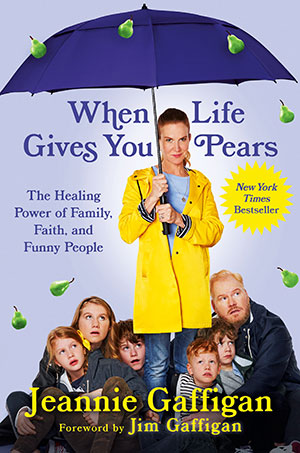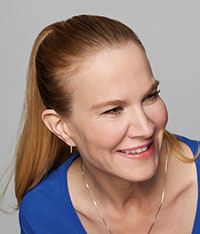 WASHINGTON, D.C. — Jeannie Gaffigan didn’t initially set out to write a book about having her brain tumor removed.
WASHINGTON, D.C. — Jeannie Gaffigan didn’t initially set out to write a book about having her brain tumor removed.
It is a story that pretty much rolled out of her usual observations on life, faith and family that have been such an integral part of what she’s been doing for the past several years as the co-writer and producer of comedy specials, two books and a television series with her husband and business part-ner, Jim Gaffigan.
“When Life Gives You Pears: The Healing Power of Family, Faith and Funny People,” released Oct. 1, recounts the unexpected discovery of a pear-sized tumor in Gaffigan’s brain in 2017, her three-day journey from learning about its existence (almost by accident) to surgery and a complicated recovery where she was unable to eat or even drink water for six months.
“Obviously when I was sitting there looking at my MRI scan and saw that thing in my brain, I did not think of a joke immediately,” she said. But in retrospect, thinking that it looked like a pear, she said, was “kind of funny but at the time I couldn’t even believe it; it seemed like something out of a movie.”
Gaffigan, a mother of five who is accustomed to seeing humor in everyday observances, could have easily hit the panic button with this “emergency medical situation, “ as she describes it.
But here’s the thing: She didn’t. She was even able to see humor in it – from the unglamorous dry shampoos at the hospital to the feeding tubes that her husband joked could be part of a new cooking show.
She is convinced that the only way she could jump from crippling fear of what was happening (or could happen) to a pretty calm acceptance of it and even an ability to see absurdity and grace in the new routines and giving up her own control stems from the strength of her Catholic faith.
As she put it: “When you recognize that God gives you ways to cope with hardships, you can’t just crawl into bed and say: ‘Just handle my life for me, it’s hard.’”
Gaffigan recognizes that her sense of humor, which she described as her “lens at which I look at life and marriage” is a gift from God, but still, she hadn’t intended to write about her way of looking at this particular situation, at first.
Prior to the 10-hour surgery and lengthy stay in the intensive care unit, she had been in the process of writing a book about what it was like to keep it together as a busy mom and wife of a touring comedi-an.
All of that was put on hold after a visit to with her children to their pediatrician who ended up recom-mending that Gaffigan get her head examined, literally, for her recent inability to hear out of one ear.
That initial test then put everything in fast forward with little time to think about it. In one interview, Gaffigan said that as she was being wheeled into surgery, she was telling her husband her computer passwords and about ordering groceries online, fearing he wouldn’t know how to keep the household routine going.
During her recovery, she promised her publicist she would finish the book she started, but he told her to put that aside noting her bout with a brain tumor couldn’t just be another chapter; it had to be its own story.
 Fortunately, it was a story Gaffigan had already been trying to piece together for her own sake – trying to remember what exactly had happened in the chaos of it all. She thought she was no different from pianists who might write songs about a personal tragedy to help them therapeutically.
Fortunately, it was a story Gaffigan had already been trying to piece together for her own sake – trying to remember what exactly had happened in the chaos of it all. She thought she was no different from pianists who might write songs about a personal tragedy to help them therapeutically.
Her initial manuscript was a lot more Catholic, she said, but in the end, she made the book for every-body. As she put it: “I made it a little more ‘you might not be Catholic or understand how the Blessed Mother understands my suffering more than anyone else does,’ but that’s the way I cope with it.’”
“I made it more universal so what that did was it brought it out of the Christian section of the bookstore and put it more in the comedy section.” And to Gaffigan, that’s evangelization, not proselyt-izing.
“It’s like saying: ‘Look, I don’t know what you would do, but this is how I did it.’ And I feel like that’s more gentle and I feel like people are more open to that. There’s no secret. I’m not trying to dunk someone into the baptismal font, and you know, handcuff them to their RCIA classes; I’m just telling my story.”
Different publishers said they were interested in prolonging publication of the book more for Mother’s Day 2020 to see where she was at that point, but Gaffigan wasn’t interested.
“In a year, I will have a different book in me,” she said, adding: “This is what happened; this is where I’m at right now, then I want to move on, because I can’t just sit there and dwell on the fact that I had brain surgery even though it’s an important part of my life. The train is moving; I’ve got to move on.”
And the train – with five kids, work, volunteering and her husband’s comedy tour – is moving rapidly. Gaffigan, who says she has recovered from the surgery but jokes that she still misses the daily nurse care, spoke to Catholic News Service Nov. 14 by phone after ducking into an empty music room at her son’s school where she was helping out.
For now, she is laser-focused on her family and a personal calling that she feels strongly about: work-ing with young people in the community and in her parish at the Basilica of Old St. Patrick’s Cathedral in New York because she is concerned that young people in the Church seem to fall off the radar in the gap years between confirmation and young adult programs.
Gaffigan concludes her book saying she is grateful for the tumor, which not only gave her a second chance but a deeper appreciation for her faith, family and the ability to swallow water.
When she had no time to mentally prepare for this surgery, Gaffigan said, she wished she could have read a book by someone with a lot going on, facing a similar crisis, and how they dealt with it.
So she thought of “that pretend person” that might pick up her book while facing a challenge, medical or otherwise, while she was writing. But she also hopes her book speaks to those who have never had anything bad happen to them.
Between the lines throughout the book is Gaffigan’s message that “all of this is just temporary, and you don’t realize that until you almost lose it.”
“If I can convey that message to people who are doing just fine, that’s even more of a victory than (reaching) people that are facing a big obstacle,” she said.
— Carol Zimmermann, Catholic News Service


